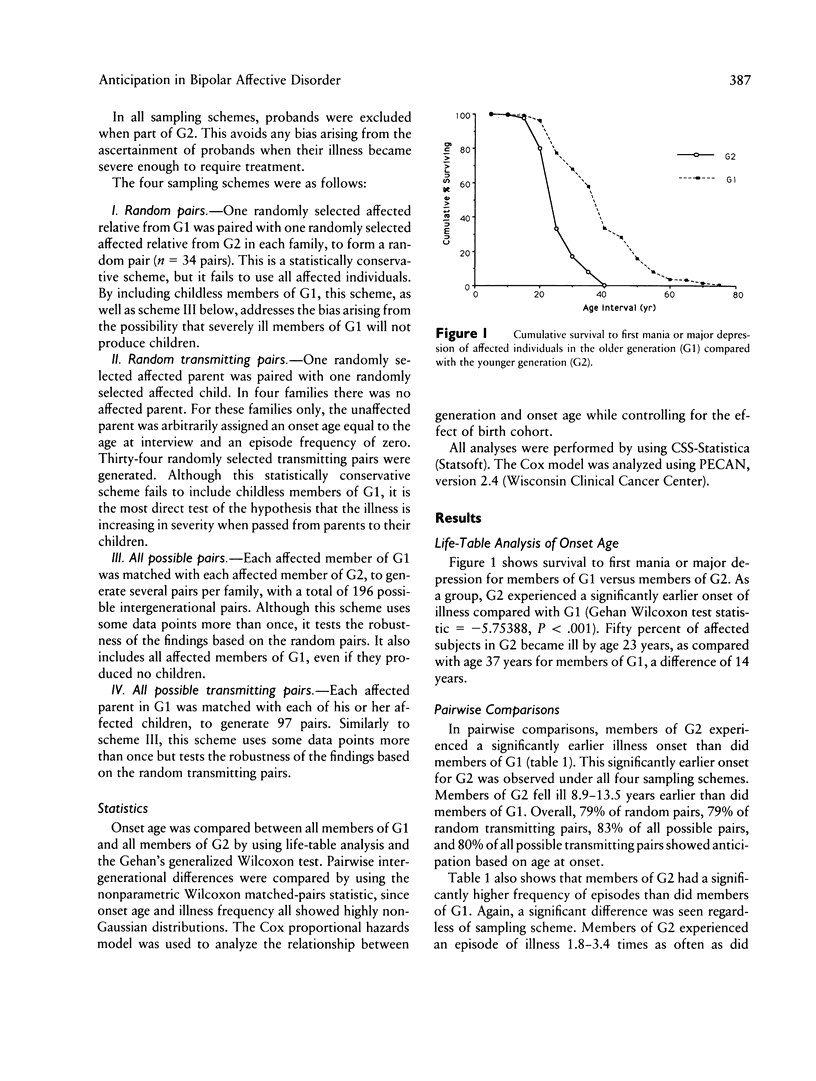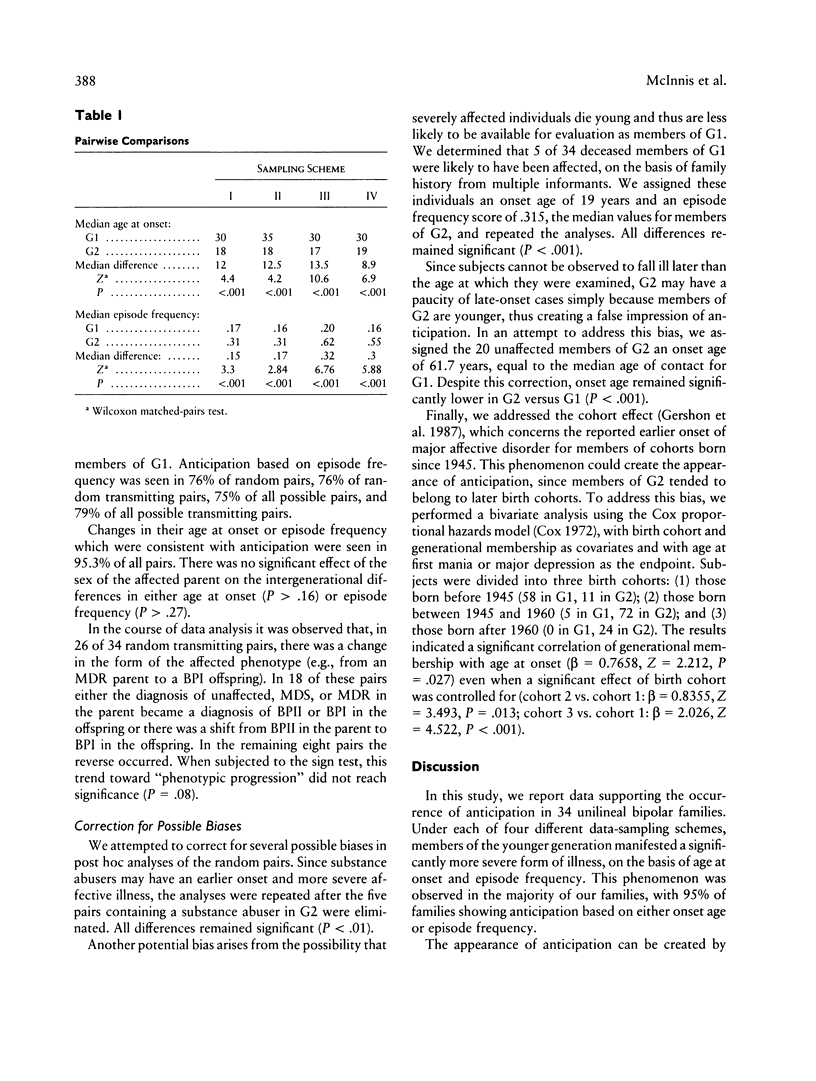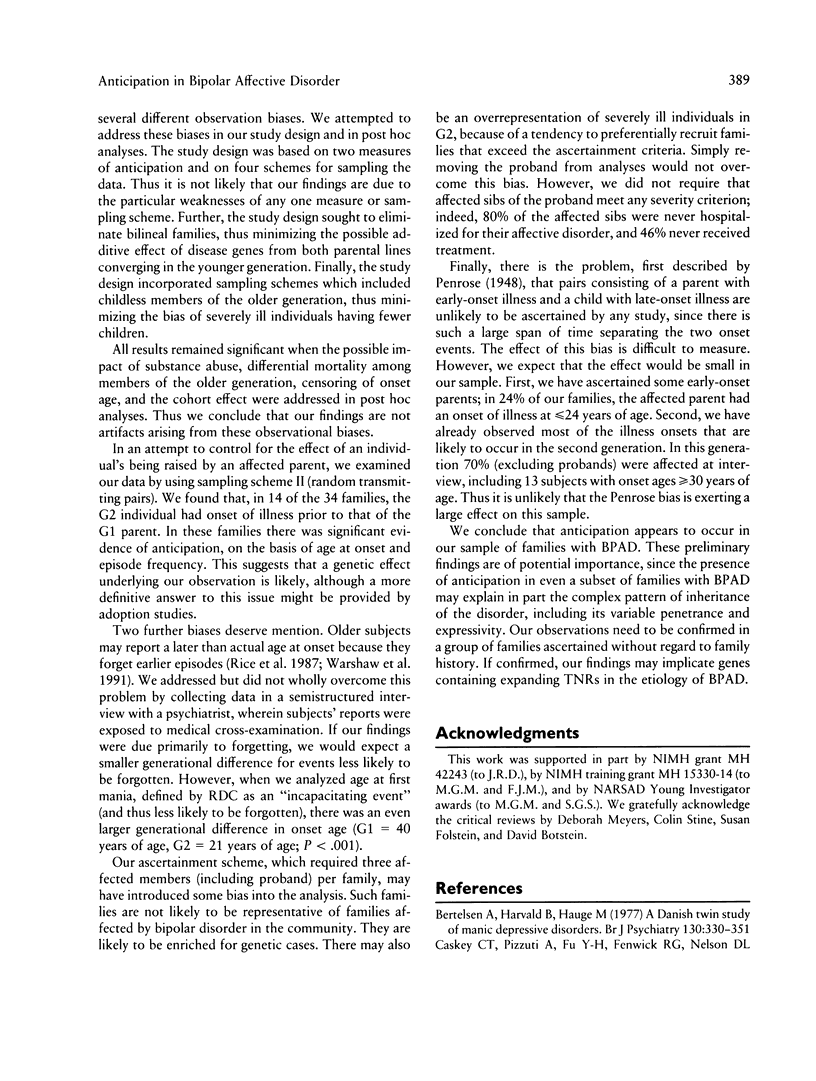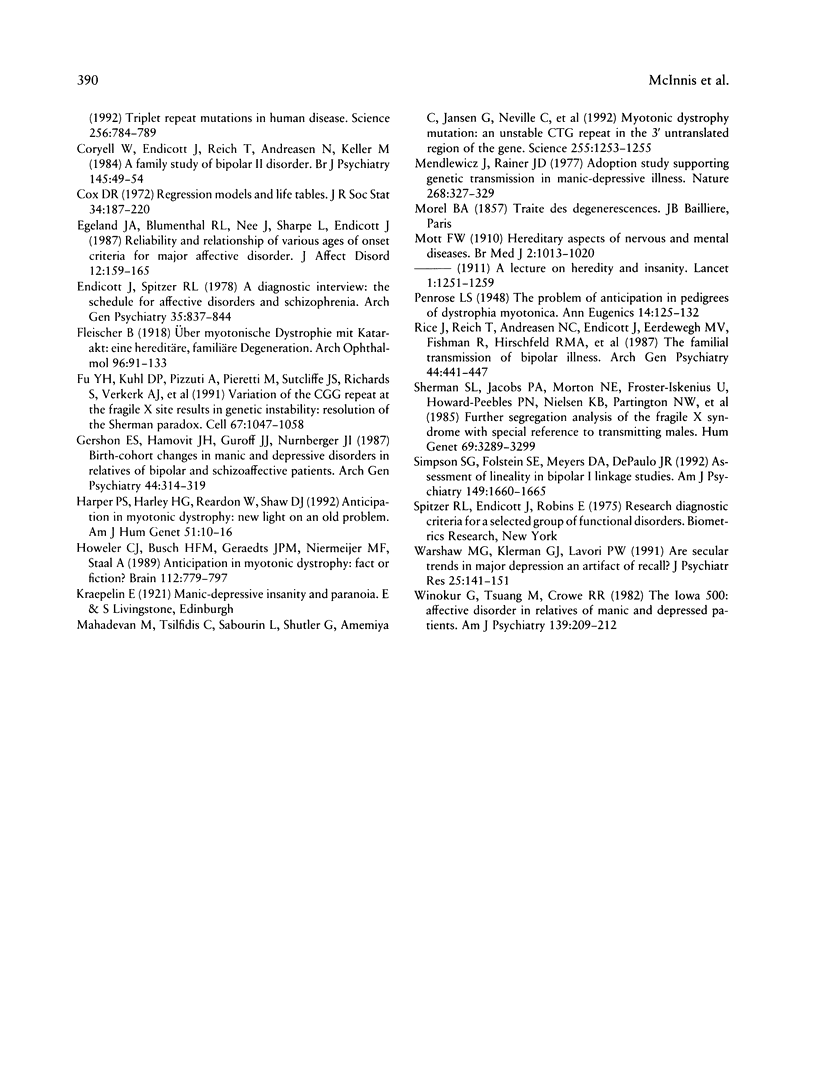Abstract
Anticipation refers to the increase in disease severity or decrease in age at onset in succeeding generations. This phenomenon, formerly ascribed to observation biases, correlates with the expansion of trinucleotide repeat sequences (TNRs) in some disorders. If present in bipolar affective disorder (BPAD), anticipation could provide clues to its genetic etiology. We compared age at onset and disease severity between two generations of 34 unilineal families ascertained for a genetic linkage study of BPAD. Life-table analyses showed a significant decrease in survival to first mania or depression from the first to the second generation (P < .001). Intergenerational pairwise comparisons showed both a significantly earlier age at onset (P < .001) and a significantly increased disease severity (P < .001) in the second generation. This difference was significant under each of four data-sampling schemes which excluded probands in the second generation. The second generation experienced onset 8.9-13.5 years earlier and illness 1.8-3.4 times more severe than did the first generation. In additional analyses, drug abuse, deaths of affected individuals prior to interview, decreased fertility, censoring of age at onset, and the cohort effect did not affect our results. We conclude that genetic anticipation occurs in this sample of unilineal BPAD families. These findings may implicate genes with expanding TNRs in the genetic etiology of BPAD.
Full text
PDF





Selected References
These references are in PubMed. This may not be the complete list of references from this article.
- Bertelsen A., Harvald B., Hauge M. A Danish twin study of manic-depressive disorders. Br J Psychiatry. 1977 Apr;130:330–351. doi: 10.1192/bjp.130.4.330. [DOI] [PubMed] [Google Scholar]
- Coryell W., Endicott J., Reich T., Andreasen N., Keller M. A family study of bipolar II disorder. Br J Psychiatry. 1984 Jul;145:49–54. doi: 10.1192/bjp.145.1.49. [DOI] [PubMed] [Google Scholar]
- Egeland J. A., Blumenthal R. L., Nee J., Sharpe L., Endicott J. Reliability and relationship of various ages of onset criteria for major affective disorder. J Affect Disord. 1987 Mar-Apr;12(2):159–165. doi: 10.1016/0165-0327(87)90009-7. [DOI] [PubMed] [Google Scholar]
- Endicott J., Spitzer R. L. A diagnostic interview: the schedule for affective disorders and schizophrenia. Arch Gen Psychiatry. 1978 Jul;35(7):837–844. doi: 10.1001/archpsyc.1978.01770310043002. [DOI] [PubMed] [Google Scholar]
- Fu Y. H., Kuhl D. P., Pizzuti A., Pieretti M., Sutcliffe J. S., Richards S., Verkerk A. J., Holden J. J., Fenwick R. G., Jr, Warren S. T. Variation of the CGG repeat at the fragile X site results in genetic instability: resolution of the Sherman paradox. Cell. 1991 Dec 20;67(6):1047–1058. doi: 10.1016/0092-8674(91)90283-5. [DOI] [PubMed] [Google Scholar]
- Gershon E. S., Hamovit J. H., Guroff J. J., Nurnberger J. I. Birth-cohort changes in manic and depressive disorders in relatives of bipolar and schizoaffective patients. Arch Gen Psychiatry. 1987 Apr;44(4):314–319. doi: 10.1001/archpsyc.1987.01800160018004. [DOI] [PubMed] [Google Scholar]
- Harper P. S., Harley H. G., Reardon W., Shaw D. J. Anticipation in myotonic dystrophy: new light on an old problem. Am J Hum Genet. 1992 Jul;51(1):10–16. [PMC free article] [PubMed] [Google Scholar]
- Höweler C. J., Busch H. F., Geraedts J. P., Niermeijer M. F., Staal A. Anticipation in myotonic dystrophy: fact or fiction? Brain. 1989 Jun;112(Pt 3):779–797. doi: 10.1093/brain/112.3.779. [DOI] [PubMed] [Google Scholar]
- Mahadevan M., Tsilfidis C., Sabourin L., Shutler G., Amemiya C., Jansen G., Neville C., Narang M., Barceló J., O'Hoy K. Myotonic dystrophy mutation: an unstable CTG repeat in the 3' untranslated region of the gene. Science. 1992 Mar 6;255(5049):1253–1255. doi: 10.1126/science.1546325. [DOI] [PubMed] [Google Scholar]
- Mendlewicz J., Rainer J. D. Adoption study supporting genetic transmission in manic--depressive illness. Nature. 1977 Jul 28;268(5618):327–329. doi: 10.1038/268327a0. [DOI] [PubMed] [Google Scholar]
- Rice J., Reich T., Andreasen N. C., Endicott J., Van Eerdewegh M., Fishman R., Hirschfeld R. M., Klerman G. L. The familial transmission of bipolar illness. Arch Gen Psychiatry. 1987 May;44(5):441–447. doi: 10.1001/archpsyc.1987.01800170063009. [DOI] [PubMed] [Google Scholar]
- Simpson S. G., Folstein S. E., Meyers D. A., DePaulo J. R. Assessment of lineality in bipolar I linkage studies. Am J Psychiatry. 1992 Dec;149(12):1660–1665. doi: 10.1176/ajp.149.12.1660. [DOI] [PubMed] [Google Scholar]
- Winokur G., Tsuang M. T., Crowe R. R. The Iowa 500: affective disorder in relatives of manic and depressed patients. Am J Psychiatry. 1982 Feb;139(2):209–212. doi: 10.1176/ajp.139.2.209. [DOI] [PubMed] [Google Scholar]


